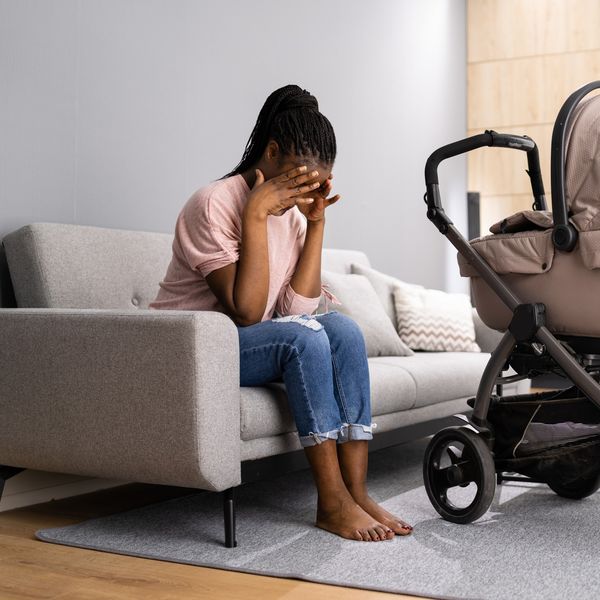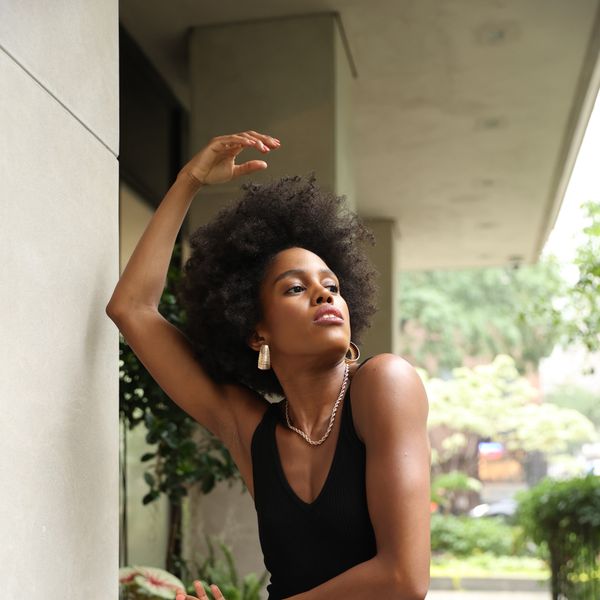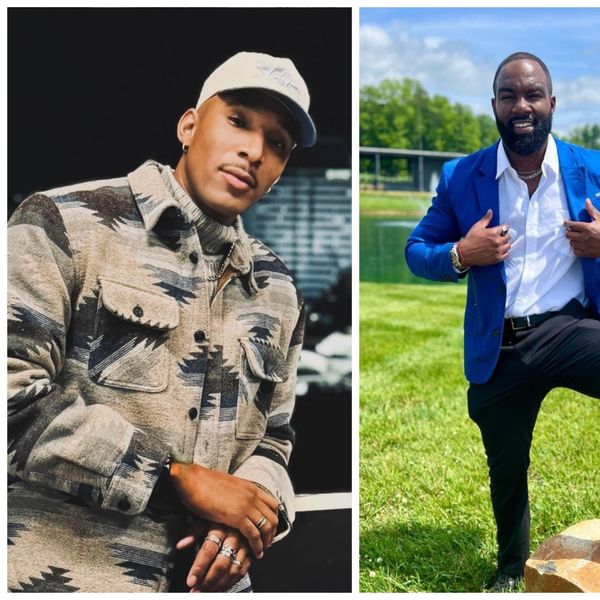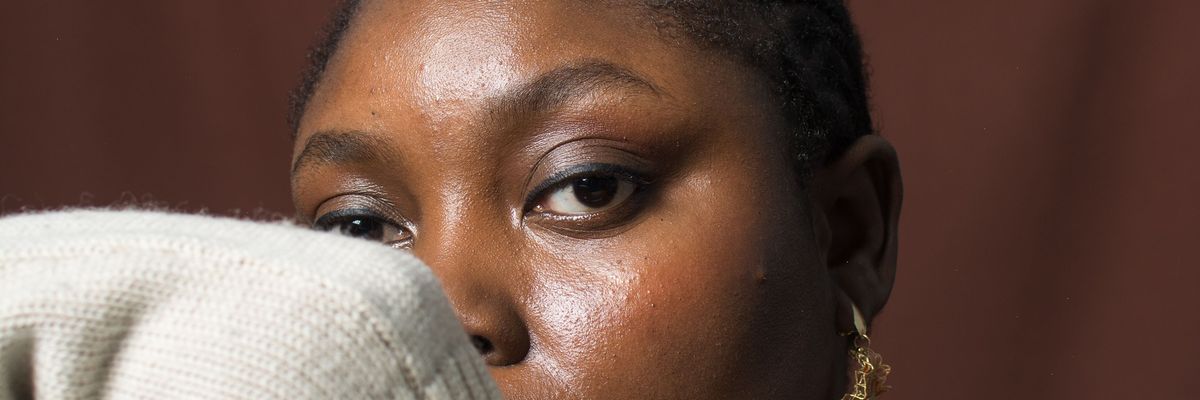8 Healthcare Professionals Share How They Practice Self-Care During The COVID-19 Pandemic

The COVID-19 pandemic has brought new meaning to the word 'superhero.' Superman and his homies can't hold a candle to the healthcare professionals, grocery store clerks, bank tellers, mail carriers, truckers, non-profit employees, civil service workers and the many more brave people who are at the forefront through this era of heaviness. Every day they sacrifice their wellness for the safekeeping of mankind.
In under two months, the United States is now the epicenter for the coronavirus disease with the number of cases rising daily. Shelter-in-place mandates and social distancing policies have become the new normal as we work together to flatten the curve. Then, there are the extra special people who work double-digit shifts delivering the best care to their patients. No matter the conditions – lack of supplies, overflowing hospitals, less time with family, sleep deprivation – they show up and they give every cell of their being to saving lives. Maybe the new normal is extreme resilience with a healthy cup of self-care.
We know that self-care has never been more important than right now because you can't pour from an empty cup. So we asked eight healthcare professionals what self-care looks like for them. Keep reading to see how they remain motivated along with some bright spots that push back the darkness.
Rose-Krystel Hegngi
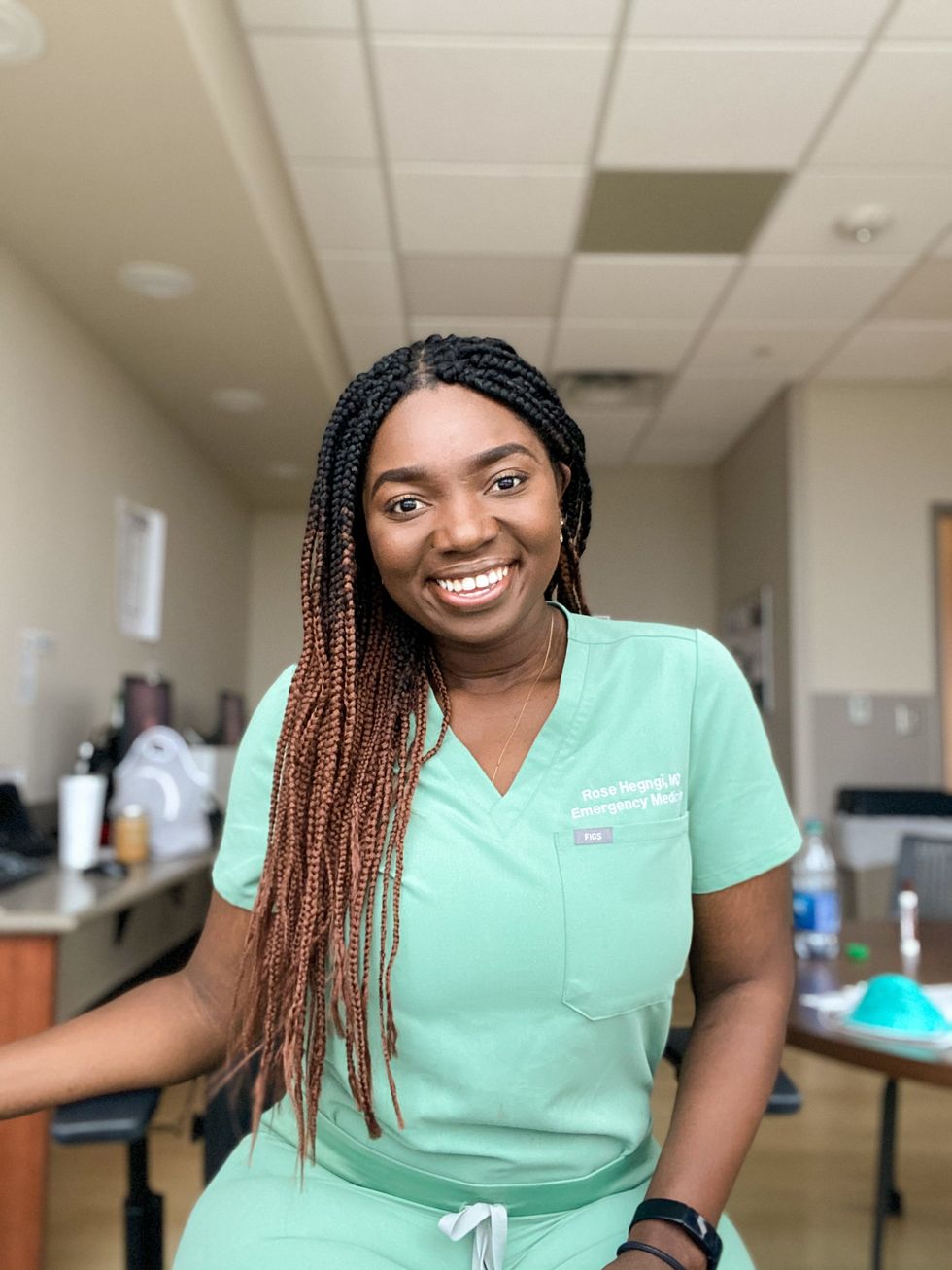
Photo Courtesy of Rose-Krystel Hegngi
Emergency Medicine Resident Physician
Baton Rouge, LA
"I recently started yoga (something I've been wanting to do for years). I'm in the very beginner stages but it's so rewarding. My work schedule hasn't really changed at all, but now on the few off days I have each month I take time to stretch and meditate since it's easy to do at home now that gyms are closed.
"The overwhelming support from companies locally and nationwide offering support and goods and free food for those working during this time has been amazing! Recently, we got an email stating medical students at LSU were volunteering to help residents with daily household responsibilities such as running errands, grocery shopping and even childcare while we work if we're feeling overwhelmed. The good that hard times bring out in other people makes me smile!
"The idea that I am doing what God has called me to do, helping others [keeps me going]. Wouldn't have it any other way— it's a privilege and an honor."
Nonee Ngazimbi
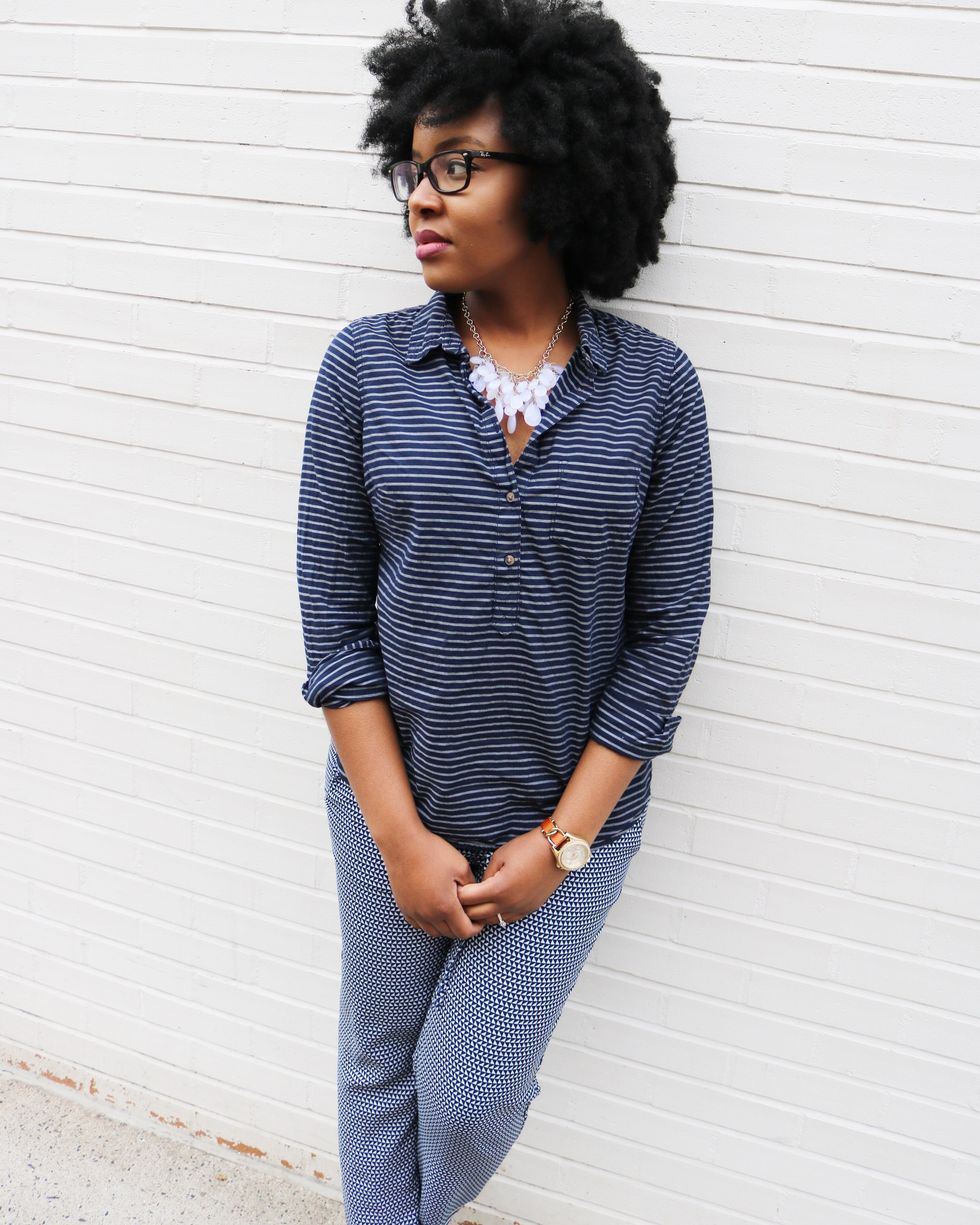
Photo Courtesy of Nonee Ngazimbi
APRN/Nurse Practitioner
West Hartford, CT
"This has been a high-stress time for healthcare workers especially when we see our colleagues, young or older, dying from COVID-19. Everyone is anxious and morale continues to dwindle as we come to the realities of this pandemic; not enough personal protective equipment (PPE) and not enough system support to support an influx of ill patients when they come.
"At work, one of my colleagues led out in a mindfulness exercise the other day. Another, brought in an aromatherapy lotion we can use periodically throughout the day to center our energy. I have been working on adequate hydration, eating well, and being intentional about being a helping hand to my friends, family, and colleagues. My colleagues and I started a group chat were we share fact-based information daily such as the newest research and policies that are coming out; helps to ease the anxiety. Lastly, my skincare routine remains the highlight of my personal day. Fresh out of a steamy shower, I always lotion my body from head to toe. I then indulge in a step-by-step facial routine to keep my skin firm, clear, and hydrated. These things are keeping me grounded and secure spiritually, physically, and emotionally right now.
"Local businesses and even former patients have poured out their love and support for us by sending us treats, lunch, dinner, cards and way more! It feels so wonderful to know that you are supported by your community. Also, we have received donations from everywhere with masks and other personal protective equipment since we are nationally short. That has been a huge blessing in the midst of this chaos.
"Every now again, I am reminded why I entered into this helping profession. My experience in various intensive care units in the last seven years has prepared me in every way for such a time as this. Praise the Lord I have the knowledge and the skills and now it really feels like [it is] my duty to humanity to utilize those to bless others."
Khaalisha Ajala
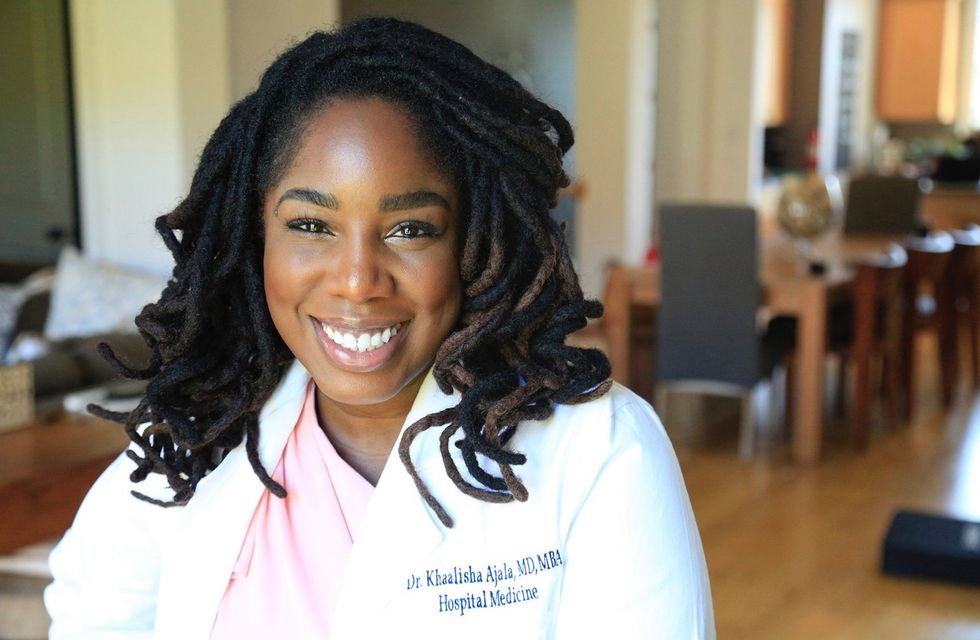
Photo Courtesy of Khaalisha Ajala
Assistant Professor of Medicine Emory Univ. & Grady Memorial Hospital Nonprofit Founder of Heartbeats & HipHop, Inc. Atlanta, GA
"I'm practicing self-care by doing my best to stay prepared during this COVID-19 pandemic where the U.S. now has the highest cases in the world. I care directly for patients who have or are have been tested for COVID-19. How do I try to stay prepared? I try to stay up-to-date on reputable medical literature, remain in daily communication with hospital leadership on the plan for our patients on a daily basis, stay as protected with proper personal protective equipment to decrease my chances of contracting COVID-19 and practice good hand hygiene.
"Also, I cry when needed, rest when needed and know that I can be vulnerable to/with my colleagues and husband as we all try to fight this pandemic and take care of our patients who are battling COVID-19 and other illnesses that bring them to the hospital.
"I'm also a DJ and when I'm not working at Grady or doing global health work in Ethiopia or Thailand, DJing is a mental health practice for me. My bright spot was tuning into D-Nice's IG live session after a really challenging day at work. I danced with 100,000 of my closest friends and witnessed the healing power of music. As a doctor and a DJ, I loved it. For a moment, I was actually the patient and 'the DJ saved my life!' He saved many others by having a social distance party. Go figure!"
Ashley Cockrell
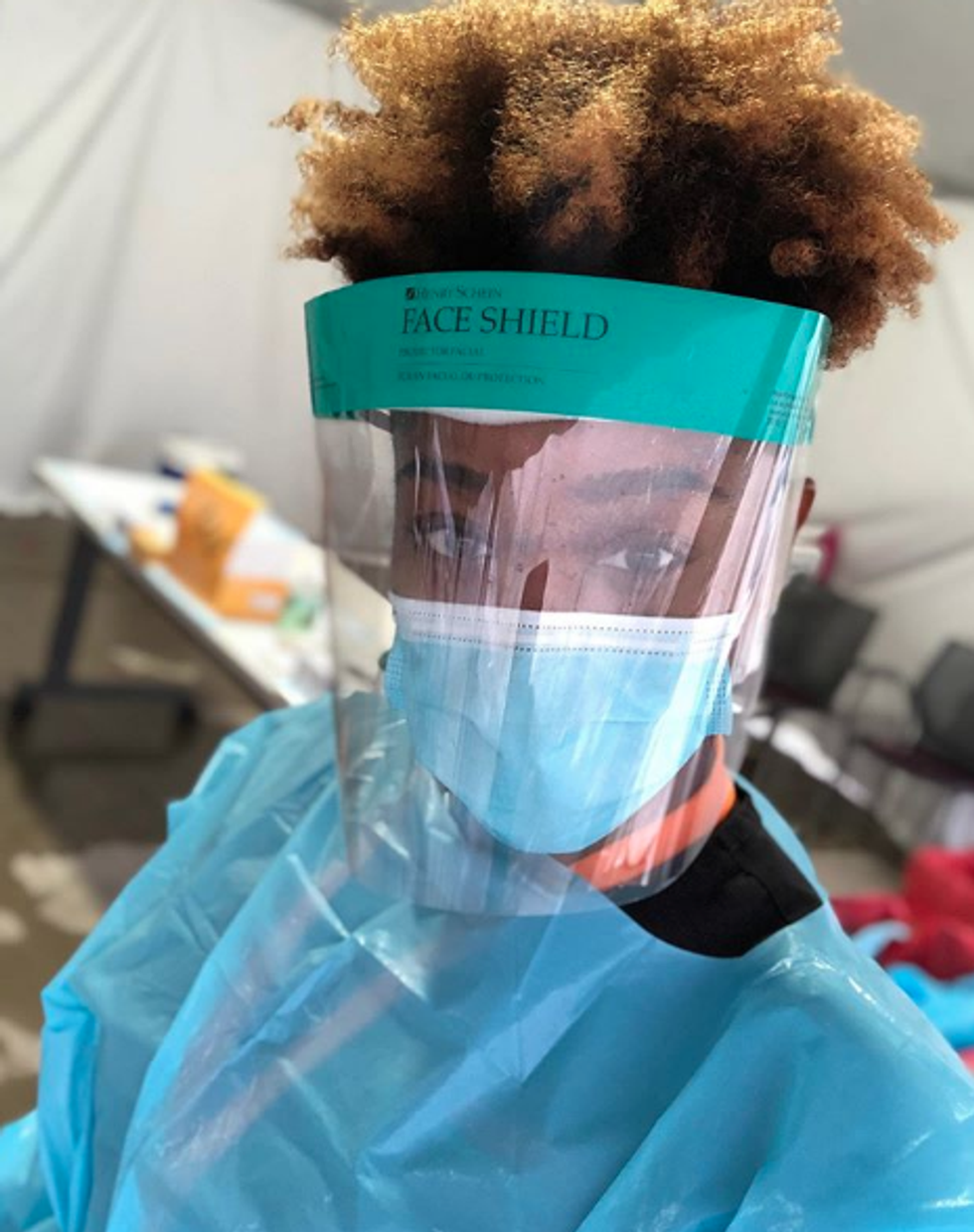
Photo Courtesy of Ashley Cockrell
Family Nurse Practitioner
Houston, TX
"I have an attitude of gratitude for my current health and for my job – it is the mainstay each day and what keeps me sane. After a long day of caring for others, it is even more important to take care of myself. I've learned that self-care is giving the world the best of you and not what's left of you. As soon as I get home from work, I take my puppy for a walk and enjoy the outdoors. I also unwind by lighting my favorite candles and enjoying my favorite music in my favorite place in the house – the couch! It is equally important for me to decompress from the day and clear my mind by engaging meditating practices. My favorite mindfulness apps include Calm, Insight timer, and Headspace.
"One moment that made my heart smile was after performing COVID-19 testing for a patient who appeared severely sick. She informed me that she stood in line at several other testing sites for hours and was eventually turned away due to high volume. Once she arrived, she was extremely thankful because not only did we get her in and out fast, but we were able to accommodate her family members who were at risk as well. She was extremely grateful for the service we provided her and complimented that we truly helped break down barriers to access care. It always brings a smile to my face when I know I've helped someone and served my mission.
"Knowing that I'm fully operating in my calling and my purpose to serve communities and help others keeps me motivated. It's fulfilling and rewarding to know that I am making an impact not only on the people I see daily, but the world at large. The genuine support, encouragement and prayers of my family and friends keeps me going. Because of my faith and support system, I'm feeling recharged and full of hope, positivity, resilience, love, and light. I am extremely grateful!"
ChiChi Okpaleke AKA Dr. Chi

Photo Courtesy of Dr. Chi
Family Medicine Physician
Tampa, FL
"Initially, as a physician, self-care was honestly not on my list of things to consider when being on the frontline in combating COVID-19. My concerns were very patient-centered, and making sure they were being treated appropriately. But it took reality to set in for me to realize that if I am not healthy, how will I be able to treat my patients effectively? These last several weeks have been stressful and I needed to buckle down and control my mental health.
"It's easy to get caught in the panic mode with all the media outlets and uncertainty on what the future holds, but I found for me that my faith never fails me. I vowed to be intentional with my mental, physical, and spiritual health; purposely integrating my workouts with yoga, prayer, and meditation. Even with all the chaos and noise, this is an opportune time to personally slow down and embrace the process of life.
"Even through this storm, a simple moment of hearing my nephews pray with the family on the phone, really made my heart smile. My family motivates me to keep striving in medicine. I'm inspired to continue to treat patients, because I know they deserve someone they can trust with their health, especially during difficult times like these. Life is hard, but the bright side is 'This Too Shall Pass.'"
Sheena Williams
Registered Nurse
Philadelphia, PA
"I have been maintaining a sleep schedule by staying active during the day and having nightly dance fitness workouts on IG live. I think it's important to have a schedule and not get into the habit of being up very late and throwing off your body. When I feel anxious or overwhelmed I pray or meditate and just list the things I'm grateful for to get my mind off of the chaos.
"I think this time home is a blessing in disguise. I rarely have time to watch a favorite show, read a book or work out. This time home has helped me achieve goals, sort through life and force me to be still. I'm enjoying time with my son and the random moments I have to read a book or relax.
"I'm motivated by my son. He needs me more than ever. I'm also motivated by my patients. They need me, so I have to stay healthy and positive for them. Our lives and how we do things will change forever, we have to support each other."
Brittany Grimes

Photo Courtesy of Brittany Grimes
Registered Nurse
Nashville, TN
"As a full-time travel nurse, I'm used to having four days off a weeks to run errands, relax and spend some QT with myself. However, with everything shut down, I can't leave the house for anything more than groceries. So, I started doing yoga and it has been a game-changer for me! I do it every morning on my off days and every night before the days I work. I am less tense, I sleep better, get up earlier and I'm more productive. NAMASTE, sis! I have also found a way to stay creative during this time by practicing calligraphy (modernly knows as 'hand-lettering'). I get lost in it for hours at a time and it makes me so happy. Oddly enough, having to be in the house during this pandemic has made me a lot more active. Although it is stressful, I am grateful.
"As an ICU nurse, I rarely get the chance to talk and interact with my sedated patients. My brightest moment recently was with a woman who had a tracheostomy. She had just gotten her speaking valve and was finally able to eat. I sat with her, fed her, brushed her teeth, combed hair and we talked. Boy, did she talk! Before that, I was having the craziest day, but after watching her hear her own voice again, none of that mattered.
"Being able to see a critical patient make a complete turnaround at the hands of my coworkers and I is what keeps me going. It is not easy and I cry more than I like to share but I will never take it for granted."
Kristamarie Collman

Photo Courtesy of Kristamarie Collman
Family Medicine Physician
Virginia
"In medicine, the mental and physical demands of the profession can be extremely challenging and tiring. Coronavirus and COVID-19 have added increased stress and uncertainty and therefore it's more important now than ever for me to look after myself. As the saying goes, you have to 'secure your own oxygen mask before assisting others.' At the end of the day, I cannot be the best doctor for my patients if I'm not performing at my physical and mental best. To do this, I try to keep a healthy diet, incorporate physical activity, and get regular sleep and rest. With constant reports being released daily about deaths and illness associated with COVID-19, it's important to protect my mental space by scheduling media and social media breaks.
"This is where a period of time where I silence my phones, disconnect from social media and turn the TV off. I use this time to either read for pleasure, journal my feelings, take a mindful walk or simply meditate to check in with my body, reflect and quiet my mind. I have also turned to activities which I used to practice when I was younger but lost touch with during my schooling and training. These activities include playing my old guitar and learning choreographed dance, both of which help me to unwind and brings me joy.
"Throughout the chaos, there have been moments that made my heart smile. A friend of the family is aware that I work in medicine and that we are experiencing a nationwide shortage of equipment such as masks. I came home unexpectedly to a package filled with a few hand-sewn masks along with a thank you note for being a doctor during this time. It reminded me that even in distressed times, human good can still prevail.
"I am constantly asked what motivates me and pushes me to keep going. For one, I know my purpose is so much bigger than me. I know that I'm helping to pave the way for many other individuals who are coming along on the journey to medicine. I am also helping people in a very real way every time I go into work.
"Sometimes I'm the first doctor they have seen in years or the first black female physicians patients have had or either way, I'm helping them in some way and they show appreciation. I will admit, I am also intrigued by the fact that I am experiencing and living through a pandemic and want to be able to tell my future children their mom was helping on the front lines!"
Did you know that xoNecole has a podcast? Subscribe on Apple Podcasts or Spotify to join us for weekly convos over cocktails (without the early morning hangover.)
Your December 2025 Monthly Horoscopes Are All About Surrender & Alignment
December is about letting go. We end the year with the need for more peace, reflection, and rejuvenation, and that is exactly what December is providing for us. The Sun is in Sagittarius, and anything is possible. This is the month to believe in that and to know that the universe is supporting you. With a Supermoon in Gemini as we begin the month as well, we have an opportunity to gain the closure we have been looking for this year and to wrap up old projects, ideas, and communication breakthroughs.
This is the month to make your peace the priority and let go of trying to control the way the tides are turning. Trust in your new beginning, and give yourself time to prepare for it this month.
A big part of the clarity that is coming through this month is due to Neptune going direct in Pisces on December 10, after being retrograde here since July. With Neptune now direct, we are able to see our inspiration and creativity a little more clearly, providing the perfect energy for dreams and manifestation to be built upon. The smoke is clearing, and it’s up to you to decide what you want to do with this newfound clarity that this transit is bringing. Mercury also moves back into Sagittarius on December 11, which is great for communication and clarity, and the adventures you were trying to see through at the beginning of November come around for you again with greater purpose and support.
On December 15, Mars enters Capricorn until the end of January 2026, and this is the extra push we need to make important changes and to be on the path towards greater abundance, stability, and prosperity. Mars in Capricorn takes care of business, and we have extra energy at our disposal during this time to do so. This transit is an ideal time to focus on your career or financial goals for next year and to start putting some of these plans into motion now. A few days later, we have the New Moon of the month, which will be in Sagittarius on December 19, and this is the perfect New Moon to manifest.
The energy is high, magic is in the air, and it’s all about moving forward with the new beginnings that are inspiring you and bringing you joy to think about right now.
Capricorn Season officially begins on December 21, and this earth sign energy is how we heal, gain closure, and build new foundations in our world. With Venus also moving into a Capricorn a few days later, there is something about peace, prosperity, and security that we are gaining in life and in love as we close out the year, and this is what we need right now. This month is about reflecting on what was, letting go of old hurt, and renewing. December is an ending and a new beginning in one, and there is magic in this space to be created.
Read for your sun and rising sign below to see what December 2025 has in store for you.
 AriesKyra Jay for xoNecole
AriesKyra Jay for xoNecoleARIES
December is a full-circle moment for you, Aries. You are seeing the gifts in your world and have a lot of gratitude for the way things have come about for you as of late. There are culminations in your world that are providing you with more abundance, stability, and community, and you are exactly where you are meant to be this month. With the Sun in a fellow fire sign and in your 9th house of travel for most of the month, December is a good time to get out of your comfort zone, explore the world around you, and get your body moving.
Mars, your ruling planet, also makes a change and moves into Capricorn on December 15, which will fuel your inspiration and power in your career space. You are making a lot of professional progress as we close out the year; however, make sure to be more mindful of your competitive drive right now. The New Moon on December 19 is the perfect opportunity for you to create some new plans and goals when it comes to traveling, education, and where you want to gain some new inspiration in your world. Overall, this is a month of things coming together for you serendipitously.
 TaurusKyra Jay for xoNecole
TaurusKyra Jay for xoNecoleTAURUS
December is about trusting your intuition, Taurus. You have a lot on your mind this month, and it’s best to delegate, communicate, and allow yourself some relief by opening up to someone and not feeling like you have to hold everything in. As we begin the month, we have a Supermoon in Gemini happening in your house of income, and the plans and projects you have been building here come to fruition for you now. This is the time to gain clarity on your financial world and to take a look at what spending habits you want to let go of here as well.
With Venus in your 8th house of shared resources for most of the month, you are doing a cleanse on your commitments, partnerships, and business ventures. You are taking a look at what you want to dedicate yourself to in the future, and what commitments you may need to let go of now in order to be in the space you truly want to be, both financially and within some of your relationship dynamics. Before we end the month, we have a New Moon in this same area of your chart, and it’s time to look at the opportunities that are presenting themselves and to trust your internal guidance system to lead you forward.
 GeminiKyra Jay for xoNecole
GeminiKyra Jay for xoNecoleGEMINI
You are moving forward fearlessly this month, Gemini. December is your month of love, passion, and dignity, and you are owning the light that you shine. We begin the month with the last Supermoon of the year, happening in your sign, and you are stepping up to the plate. You are showing up, owning how much you have grown this year, and allowing yourself to heal while also acknowledging that you have done your best and you deserve to have fun in the midst of the changes you are creating.
Mercury, your ruling planet, is officially out of retrograde, and you can use this energy to the fullest potential now. With Mercury in your 7th house of love, it’s time to speak from the heart and to talk about the things that matter and that are inspiring you right now to your loved ones. You never know what kind of epiphanies you may have when you open up the conversation to others. Before the month ends, you have a New Moon in this same love area of your chart, and this New Moon is all about manifesting romance, commitment, and abundance in your world.
 CancerKyra Jay for xoNecole
CancerKyra Jay for xoNecoleCANCER
December is an opening for more love, more joy, and more freedom in your life, Cancer. You have come to a place where you hold so much gratitude in your heart for where you are today and where your heart is shining, and things come together for you with more ease right now. With the Sun in your 6th house of health, work, and daily routines for most of the month, you are getting your ducks in a row while also putting more energy and effort into taking care of yourself, your priorities, and your well-being. This month surprises you in many ways, and it’s because you are showing up.
Mars and Venus both move into your house of love, relationships, marriage, and abundance this month, and you are making strides in your love life. You have both of these opposing forces on your side and are being recognized for the love you are while also receiving the love you want. This month, overall, is about focusing more on the positives in your world and letting your heart have its joy. Before December comes to an end, there is a New Moon in Sagittarius, and this is the perfect opportunity to create the plans you want to see through next year, especially when it comes to your work life, colleagues, business ventures, and health.
 LeoKyra Jay for xoNecole
LeoKyra Jay for xoNecoleLEO
The scales of karma are balancing, and they are balancing in your favor this month, Leo. December is your month of truth, and of seeing it clearly in your world. The Sun is in your house of romance, pleasure, and happiness for most of the month, and it’s time to relax, be in the present moment, and allow what is meant to be, to be. With a Supermoon in your 11th house of manifestation as December begins, this is a powerful month for seeing your dreams come to fruition, and for feeling like the intentions you have set this year are finally here for you now.
Mars also moves into your 6th house mid-month, and this is the perfect energy to have to move into the new year. You have extra energy at your disposal right now and are feeling fearless with what is possible for you and your daily routine. Before the month ends, we also have a New Moon in a fellow fire sign, Sagittarius, and this is a breakthrough moment for you and your heart. December, overall, wants to show you how loved and supported you are and will be doing so in magical, unexpected, and concrete ways.
 VirgoKyra Jay for xoNecole
VirgoKyra Jay for xoNecoleVIRGO
December is a month of victory, Virgo. You are showing up and experiencing some new successes in your world that move you forward on your path in life. With a Supermoon in your 10th house of career as we begin the month, the effort and intentions you have made this year come into full bloom, and you are being recognized for who you are and the good work you have done. This month is all about showing up and allowing yourself to be seen and loved, knowing that you deserve the support and opportunities you are receiving.
Mars moves into Capricorn on December 15, which brings the passion and excitement into your love life, hobbies, and little pleasures in life that light you up. You want to have fun this month and are going to be walking into the new year with this fearless, happy, and spontaneous energy within you. Before the month ends, Venus also enters Capricorn, and in this same area of your chart, you have a lot to look forward to and believe in right now. Overall, December wants you to be happy and will be doing everything possible to make that happen for you. This is your month to shine, Virgo.
 LibraKyra Jay for xoNecole
LibraKyra Jay for xoNecoleLIBRA
December is a month of opportunity for you, Libra. New doors open, and you are financially making breakthroughs this month because of it. December begins with a Supermoon in your 9th house, and you are getting a clearer view of where you have been making strides in your life and how it has all brought you here to this present moment of freedom. This month is showing you what happens when you are fearless with your purpose and when you believe in yourself and what you are worthy of.
Moving further into December, Mars moves into your 4th house of home and family mid-month, and you are closing out the year in your safe spaces. You are spending more time with your loved ones and taking the time to quiet your mind and listen to what your heart has been telling you. Before the month ends, we have a New Moon in Sagittarius, happening in an area of your life that deals with communication. This is a great time for getting the answers you have been looking for and for feeling more clear-headed and confident about the decisions you are making as you move into the new year.
 ScorpioKyra Jay for xoNecole
ScorpioKyra Jay for xoNecoleSCORPIO
Patience is a virtue this month, Scorpio. December is all about remaining patient and vigilant with what you are creating in your world, and knowing that the universe has your back. It’s time to be reminded of the power of hope, and this month is an opening to greater clarity in your life. There is a lot of energy in your financial zones right now, and this is providing you with new opportunities and new insight; however, the speed at which things come about for you may feel daunting. Keep your head up and eyes focused on what you want and know that you are more than worthy of receiving it.
With Mercury in your 2nd house of income this month, December is a good time to plant new seeds and to think about where you want to be financially a month from now or even a year. This month is asking you to think bigger and to think more long-term so that you can set the appropriate plans into motion now. We also have a New Moon in your house of income before the month ends, and this is when you will see more of your dreams come to fruition in this area of your life, and have more opportunities to build. Overall, December will be teaching you a lot, Scorpio.
 SagittariusKyra Jay for xoNecole
SagittariusKyra Jay for xoNecoleSAGITTARIUS
Sagittarius Season is here, and there is a lot in store for you this month, Sag. December is all about what you are dedicating yourself to. It’s about setting your intentions and putting the work in to back up your dreams, and about getting things in order so that when the new beginnings come, you are ready for them. The Sun and Venus are in your sign for most of this month, and there are a lot of eyes on you right now. You have the potential to create a new beginning for yourself, and it’s time to invest in yourself, your love life, and your dreams.
Mercury moves into Sagittarius on December 11, and this is giving you another opportunity to see through some of the plans that you had initiated in November. Mercury was retrograde in your sign last month, and there may have been some disruptions to your vision and plans for the future, and now this energy is turning around for you. Before the month ends, we also have a New Moon in Sagittarius, and you are walking through new doors fearlessly. You are catching others by surprise by your growth this month, and you are thinking a lot about your purpose, future, and plans for the new year.
 CapricornKyra Jay for xoNecole
CapricornKyra Jay for xoNecoleCAPRICORN
December is all about the vision, Capricorn. You are moving through a lot of changes and transformations this month, yet they are giving you a chance at a new beginning in the process. You are focused more on the future and what goals you want to manifest for yourself right now, and are ready to let go of what hasn’t been working for you. With the Sun in your 12th house of closure for most of December, this is your time for healing, but remember, healing doesn’t have to be isolating or boring; you can thrive while you renew, and you are this month.
Mid-month, the excitement picks up for you, and you are feeling more energized than you have in a while. Mars moves into Capricorn until the end of January 2026, and you are being proactive with your goals, intentions, and passions. You are a force to be reckoned with this month, and you are making things happen for yourself with confidence. Capricorn Season officially begins on December 21 this year, and this is definitely speeding up your healing process. You are breaking free from what was, and with Venus also moving into Capricorn before the month ends, you are leaving this year in high spirits and with love opening a new door for you.
 AquariusKyra Jay for xoNecole
AquariusKyra Jay for xoNecoleAQUARIUS
December is all about community, creativity, and manifestation, Aquarius. This is the month to work together with others to help bring your dreams to life. You are in a space of inspiration, empowerment, and beauty, and are creating more of this energy around you and in your world. Look out for what support comes your way this month and know that you don’t have to do everything alone to succeed. With the Sun in your 11th house of manifestation and friendship, your intentions are coming to fruition, and it’s time to celebrate with the people you love and to own how far you have come this year.
On December 19, we have a New Moon in Sagittarius, lighting up your life in all of the best ways possible. This is your New Moon of freedom, victory, and magic, and you are seeing new beginnings appear that you were once just hoping for. Before the month comes to an end, Venus moves into your 12th house of closure, and after an active and successful month, you are ready to relax, heal, and give your heart some of the attention it has been asking for. You are moving into the new year with the need to release and renew what hasn’t been working in your relationships, and you are finally ready to.
 PiscesKyra Jay for xoNecole
PiscesKyra Jay for xoNecolePISCES
December is a big month for you, Pisces. You are making some huge accomplishments this month, and are feeling like everything you have been through this year has been worth it for these moments that are coming to fruition for you now. The Sun is in your 10th house of career and reputation for most of the month, and this is where a lot of your focus is right now. You are claiming your successes and putting yourself out there in ways that not only serve you, but that inspire others as well.
Neptune officially goes direct on December 10, after being retrograde in your sign since July, and you are finally seeing things a little more clearly. You are feeling renewed inspiration and passion in your life, and your intuition is your strongest asset right now. Before December comes to an end, we also have a New Moon in your 10th house of career, and what happens now not only changes things for you in the present, but it also opens new doors and what is possible for you in the new year as well. Overall, you are on top of your game this month and are owning the joy and empowerment you feel.
Featured image by Kyra Jay for xoNecole
Skincare Hacks That Actually Make Hyperpigmentation...Worse
Something that I wish I had learned back when I was experiencing more breakouts than I do at this point in my life is the difference between hyperpigmentation and actual acne scars. Although people oftentimes believe that they are one in the same, that actually isn’t the case.
Yes, both can result in darker marks on your skin; however, while hyperpigmentation can change the color of it, scars often also alter your skin’s texture. And yes, it’s important to know the difference between the two because, that way, you know how to treat each issue.
Since the focus today is on hyperpigmentation, let me break that down a bit further. Basically, what gives your skin pigment is melanin. Well, when your skin cells end up getting damaged or injured, oftentimes your body’s response is to create more melanin as a part of the healing process. Problem is, sometimes your system overproduces melanin, and that can lead to darker patches of skin. This can especially be the case for our skin since we naturally produce more melanin anyway.
When hyperpigmentation transpires, we usually want to get rid of it as soon as possible. And while doing things like applying sunscreen, using skin lightening products, and even taking certain vitamins can help — the main thing to do is incorporate a gentle skincare regimen and then use patience with it. If you don’t and you go overboard in your approach, you could look up and end up with hyperpigmentation issues that are far worse (and longer lasting) than they were to begin with.
How? I’ll explain.
Using Products That Create Breakouts
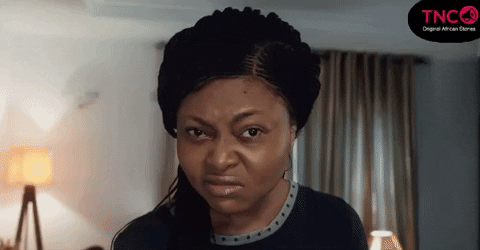 Giphy
GiphyWho likes getting a pimple? For me, though, what pisses me off to no end is that there is about a 70 percent chance that if one pops up, some sort of hyperpigmentation is going to be left behind whether I mess with it or not. Ugh. The reason why is because zits bring inflammation and inflammation can trigger hyperpigmentation.
So, you know what that means, right? It’s important to do all that you can to avoid getting a pimple in the first place and that includes not using products that will clog up your pores or irritate your skin like lanolin, thick butters (especially on your face), mineral oil, D&C coloring, a fatty acid called isopropyl palmitate — these are a few things that can lead to breakouts, if you’re not careful. That’s why it’s always a good idea to read the labels of the things before purchasing them.
Oh, and when it comes to things like shea and mango butter, it’s usually best to use them on other parts of your body than your face (because your face is more fragile than, say, your arms or legs).
Doing Too Much Exfoliating
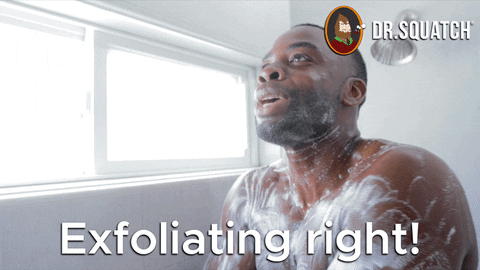 Giphy
GiphyI am a fan of DIY chemical peels; so much so that I wrote an entire article about it a couple of years ago (check out “I've Been Doing At-Home Chemical Peels. Here Are The Pros And Cons.”). The things that I like most about them are they are a super-effective way to exfoliate and even out my skin tone. That said, though, be careful with doing too much exfoliating whether it’s via a chemical peel, a skin scrub or even dry brushing.
Not only can over-exfoliating irritate your skin, it can dry it out, cause lots of skin flakes, lead to inflamed skin — and all of this can result in hyperpigmentation as your skin is in the process of “getting back to normal.” So, just how often should you exfoliate? Unless your skin is really oily, 1-2 times a week is more than enough (2-3 if it is on the oily side).
Layering with Too Many Products
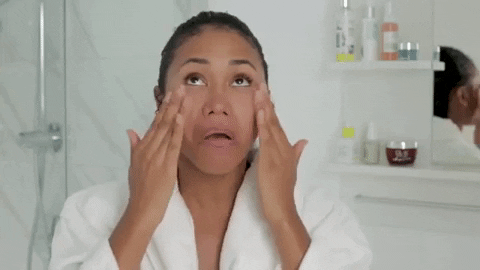 Giphy
GiphyOh, I know — if you watch too many of those TikTok and Instagram videos where women are applying 6-10 products on their face before adding any make-up to it, it can tempt you to follow suit. Use some caution with that, though. Each skincare product comes with its own list of ingredients and every time you add something else that has another set of ingredients onto it, that increases the chances of you irritating your skin or causing it to break out.
My two cents would be to ease into each product. Start with one thing and, if it’s all good (after about a week or so), incorporate another. Oh, and try to keep it down to 3-5 skincare products tops. When it comes to effective skin routines “less is more” is a motto to live by. Otherwise, redness, flaking and hyperpigmentation may be in your future.
Using Skincare Products That Contain Fragrance
 Giphy
GiphyAlthough applying skincare products that have a nice scent to them can cause your skin to smell amazing, sometimes they can be both an irritant as well as an allergen — and that can cause your skin’s barrier to weaken or become really irritated. And again, whenever your skin is damaged in some way, the recovery process can lead to hyperpigmentation. So, it really is best to avoid scented skin products at all costs (if you want flawless skin, that is).
Applying Too Much Heat
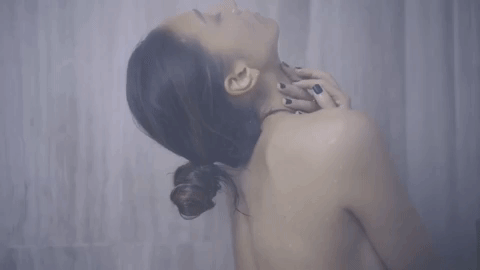 Giphy
GiphyBet you didn’t see this one coming. How about increased blood flow, over time, can lead to hyperpigmentation. Basically, it’s because of the fact that, sometimes, too much consistent blood flow can result in skin inflammation and, as we already discussed, when the body is healing from inflammation, that can sometimes cause hyperpigmentation to occur.
The takeaway here: use sunscreen when you’re outdoors and try to keep those scorching hot showers to a minimum. Being in warm water for between 7-10 minutes is ideal.
Not Testing Products (Especially Acids) on Your Arm First
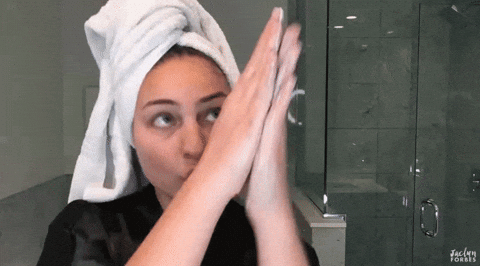 Giphy
GiphySomething that definitely keeps my skin glowing is certain acids: hyaluronic acid, mandelic acid and kojic acid soap (oh and some vitamin C extract too), especially. All of these are pretty good on darker skin tones; however, because we all are different, before applying any acid to your skin, make sure to test it on your arm first (and wait 48 hours, just to be sure that the coast is clear).
Trust me, I know of what I speak because I once tried some pretty potent pineapple extract on my face once and it mildly burned the lower part of my right cheek to the point where it took about four months before everything turned back to normal. Hmph, if I can keep anyone from experiencing that drama, I absolutely will.
7. Experimenting with Harsh Essential Oils
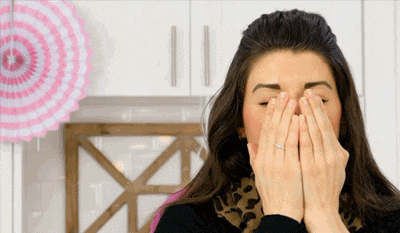 Giphy
GiphyListen, if you want a zit to go away, damn near overnight, apply some tea tree oil to it. Just make sure that you dilute it with a light carrier oil (like grapeseed, jojoba or rosehip oil) first. Why? Oh, I have learned from very up close and personal experience that certain essential oils can also burn your skin and, as we’ve already discussed, ad nauseum at this point, damaged skin typically results in hyperpigmentation on some level. Yeah, essential oils are a blessing. They are also nothing to play with. Dilute, dilute, DILUTE.
___
You know, they say that it can take several weeks, if not many months, for hyperpigmentation to totally fade away. Hmph. To me, that’s even more incentive to do all that you can to avoid it transpiring in the first place — and that includes NOT incorporating counterproductive skincare routines and regimens.
The more you know, sis. For real.
Let’s make things inbox official! Sign up for the xoNecole newsletter for love, wellness, career, and exclusive content delivered straight to your inbox.
Featured image by Shutterstock





